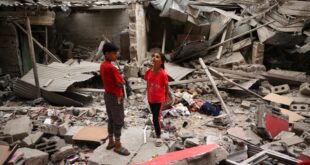Atomic bomb exploded on Nagasaki in southwestern Japan on Aug. 9, 1945, killing at least 40,000 people

On Aug. 9, 1945, the U.S. military dropped an atomic bomb on Nagasaki, Japan, instantly killing at least 40,000 civilians. It followed a similar attack on Hiroshima three days earlier, which claimed the lives of at least 70,000 people.
The 78th anniversaries of these two tragic events from the Second World War coincide with the release of Oppenheimer, a movie that focuses on J. Robert Oppenheimer, a prominent physicist who played a crucial role in the development of the first nuclear weapons.
This blockbuster film, directed by Christopher Nolan, has broken box office records by raking in over $500 million US worldwide, according to official estimates provided by Universal Pictures, the film's distributor.
Japan is among the countries where Oppenheimer has not yet been released.
Hugh Gusterson, an anthropologist specializing in militarism and nuclear policy at the University of British Columbia, spoke to host Chris Walker on CBC's Daybreak South about the significance of the nuclear bombing of Nagasaki, the reception of Oppenheimer in Japan and the future of nuclear weapons.

Hugh Gusterson is reflecting on the risk posed by nuclear weapons upon the 78th anniversary of the bombing of Nagasaki, Japan on August 9.
This interview has been edited for length and clarity.
Can you help us understand the significance of the anniversaries of the bombing of Hiroshima and Nagasaki?
Most of us don't think about nuclear weapons very much — the governments that own them try not to draw too much attention to them. I think the anniversaries are really the only time when people stop and pause and reflect on the continuing existence of these weapons.
Obviously, if you're Japanese, the anniversaries have an additional significance in terms of the suffering of the Japanese people during World War II and the way that war ended.
Why do you think it's important to remember the attack on Nagasaki specifically?
It's ironic that we're talking about this on Nagasaki Day and not Hiroshima Day because usually it's Hiroshima Day that gets all the attention, and Nagasaki Day gets forgotten. In a subtle but very important way, Nagasaki has a different significance from Hiroshima.
The U.S. dropped its second nuclear weapon only three days after it bombed Hiroshima. It didn't really give the Japanese enough time to assess the damage of the original atomic bombing and discuss the significance of it and have a chance to surrender. It was as if the U.S. was really on autopilot. There were four or five more bombs in the pipeline, ready to be dropped in the next month or so.

In retrospect, we look back at these as horrific events, even if we think that they were ultimately justified and had to be done. But what's striking is the way that the U.S. military was treating them as really normal weapons it was ready to drop whenever they became available.
To me, one of the lessons of Nagasaki is the importance of civilians stepping in and saying we need to really think about these weapons.
Oppenheimer sparked a lot of public discussion about the impact of these weapons. How is the movie being received in Japan?
The Japanese reaction, as far as I've been able to ascertain, is to be upset that the film doesn't depict the bombing of Hiroshima and Nagasaki. It's very much focused on the drama of the American scientists, and there's no footage from Hiroshima and Nagasaki. They feel that the film compounds the ways in which the suffering of people in Hiroshima and Nagasaki is being made invisible.
I would actually defend Christopher Nolan's choice in making the film that way. I won't spoil the film, but especially in view of the very last line spoken by Oppenheimer and Einstein, It's clear that Nolan wants us to think about the danger nuclear weapons represent to the entire human race going forward. He wants our focus to be on what might happen to all of us in the future because of these weapons.
If he'd had a lot of footage from Hiroshima and Nagasaki, people would have come out of the movie theatre, and they would have been discussing whether it was right to bomb Hiroshima and Nagasaki, not the danger the weapons posed to all of us going forward.
This is one of the only days when people reflect on the continuing existence of nuclear weapons. You spend more days than probably all of us thinking about this. What should the rest of us know?
You should know that the United States, for example, spends more money and constant dollars on nuclear weapons research and development now than it did during the Cold War. The number of nuclear weapons has come down enormously, but if there were a nuclear war, it would still kill hundreds of millions of people around the planet, both immediately and with long-term fallout because of nuclear winter.
Vladimir Putin has made not very veiled threats to use nuclear weapons in Ukraine if things get desperate. Between the Americans and the Russians, there's only one arms control treaty left limiting the number of weapons, and that's going to expire in two or three years.
We're in a situation where enormous resources are still being poured into maintaining the weapons, building new ones to replace the old ones as they wear out. There are no negotiations to further reduce the numbers.
The doctrine of mutually assured destruction, some argue, has ensured peace between major powers for 80 years. How much confidence do you have in that stability now?
It's a difficult question to answer because we don't know what situations we might get into in the future.
My own instinct is that had nuclear weapons not existed, the Americans and the Soviets would have fought a terrible war in which millions and millions of people would have died. I can't prove it, but all the nuclear weapons scientists that I've interviewed for my books strongly believe that to be the case, and I think that their belief is quite plausible. At least up until now, the weapons may well have saved millions of lives.
But you have to believe in a kind of human infallibility appearing over the horizon far into the future. You have to believe that eight or nine countries with nuclear weapons and more may acquire them in the future, but no one will make a miscalculation, and none of those countries will have a leader who's somewhat crazy and decides to take a risk.
If people believe that the human race is capable of managing these weapons without ever making a mistake, then we should keep them. That's not my belief.

You've seen the film and people may be going this weekend to see the film. What would you like them to keep in mind as they watch?
It's an amazingly complicated film. There's so many characters, and it keeps going backwards and forwards in time. It's almost as if you need to have a piece of paper with you to keep track of everything.
I would tell people to watch out for the scene where the bomb is finally tested and ask why they think Nolan filmed it in exactly the way that he did. It's a very striking depiction of the test itself.
With files from Daybreak South
*****
Credit belongs to : www.cbc.ca
 MaharlikaNews | Canada Leading Online Filipino Newspaper Portal The No. 1 most engaged information website for Filipino – Canadian in Canada. MaharlikaNews.com received almost a quarter a million visitors in 2020.
MaharlikaNews | Canada Leading Online Filipino Newspaper Portal The No. 1 most engaged information website for Filipino – Canadian in Canada. MaharlikaNews.com received almost a quarter a million visitors in 2020.







